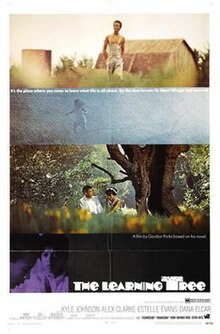The Learning Tree
| The Learning Tree | |
|---|---|
 |
|
| Directed by | Gordon Parks |
| Produced by | Gordon Parks |
| Written by | Gordon Parks |
| Starring |
Kyle Johnson Alex Clarke Estelle Evans Dana Elcar Mira Waters Joel Fluellen Malcolm Atterbury Richard Ward |
| Music by | Gordon Parks |
| Cinematography | Burnett Guffey |
| Edited by | George R. Rohrs |
|
Production
company |
|
| Distributed by | Warner Bros.-Seven Arts |
|
Release date
|
August 6, 1969 |
|
Running time
|
107 mins. |
| Country | United States |
| Language | English |
| Box office | $1.5 million (rentals) |
The Learning Tree, written and directed by Gordon Parks, is a 1969 drama film produced and released by Warner Bros.-Seven Arts. The film tells the story of a young African American growing up in rural Kansas during the late 1920s and early 1930s, when racial discrimination was a social norm and legally sanctioned in parts of the United States. The Learning Tree is based upon Parks' 1964 semi-autobiographical novel of the same name. It is the first Hollywood studio film to be directed by an African American.
In 1989, The Learning Tree, was selected for preservation in the United States National Film Registry by the Library of Congress as being "culturally, historically, or aesthetically significant".
Newt Winger (Kyle Johnson) is an African-American teenager living in rural Kansas in the late 1920s and early 1930s. He generally confronts the prejudices of the era with pride and an even temper, unlike his hot-headed friend Marcus Savage (Alex Clarke). As circumstances slowly pull Newt and Marcus further apart, Newt witnesses a murder – one committed by Marcus' father Booker (Richard Ward).
When Newt's decision to come forward as a witness leads to Booker's suicide, Marcus ambushes and confronts Newt with a gun – resulting in a vicious fight. Newt wins the fight but spares Marcus' life, only to watch helplessly as Marcus is shot and killed by a racist sheriff (Dana Elcar).
The film was well received by critics; Parks was applauded for the story, actors and the cinematography. It would lead to other serious films made by black filmmakers, while a few white filmmakers followed along with more dramas about black Americans. Among the more serious works made were Black Girl and Sounder (both 1972); these, among other films, contrasted with the large number of blaxploitation movies also released during the 1970s. The screenplay that Parks wrote was registered and placed in the records of the Library of Congress in Washington, D.C.
...
Wikipedia
